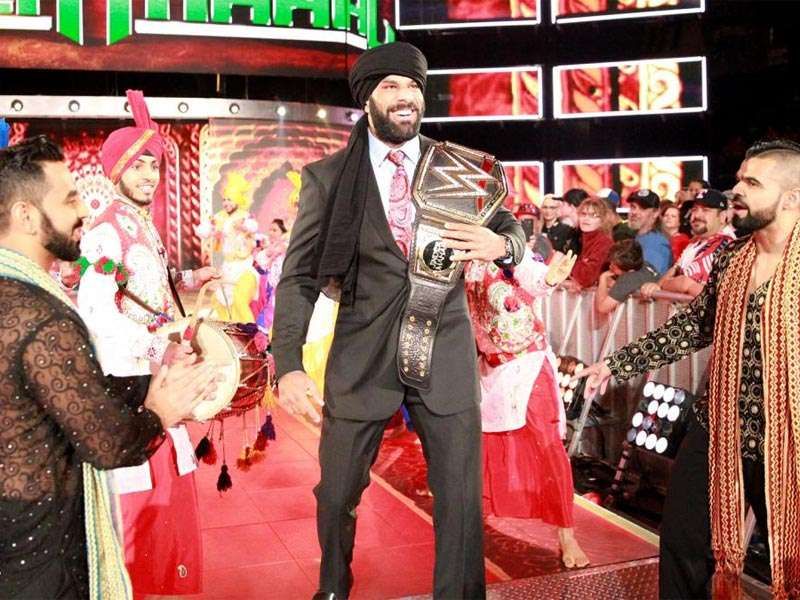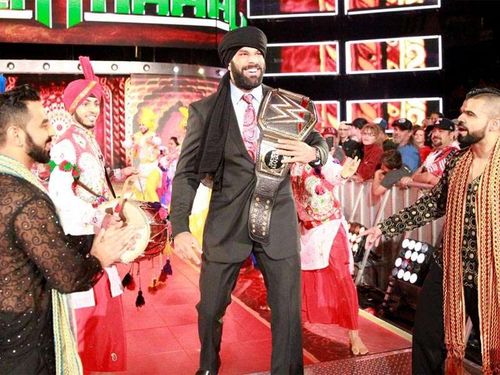
Jinder Mahal: From The Maharaja to the Punjabi Celebration - all you need to know about him
If you were to categorise my fandom of professional wrestling, you'd essentially group me in with the casual fanbase. That's what I've been for several years; just a casual fan of the WWE product. I would only tune in for the major PPV's. If I saw any interesting storylines developing via social media, I'd tune into the next televised show.
When it comes to the WWE, I'm intrigued simply by the character development. I'm intrigued by the layout of story arcs and character arcs. The feuds and the betrayals. It's the best part of wrestling. The story that's being built around the impending match that's going to take place. As a casual fan, it was interesting to pop in at random times and see how a certain character arc was developing.
The main-event scene was always interchanging with the same group of 4-5 superstars. Their characters were evolving and going through different struggles (Ex. Seth Rollins) but it was still the same mix of superstars that surrounded the main title picture. That is why everyone was in complete and utter shock when Jinder Mahal entered the main title scene seemingly out of thin air.
I was ecstatic when I found out Jinder Mahal was booked to challenge Randy Orton for the WWE Championship at Backlash. I was beyond myself with the idea that Jinder Mahal, a Canadian-born PUNJABI, was getting the chance to build a program with someone with the pedigree of Randy Orton. That's all I cared for in that moment. The fact that he was getting the opportunity to build the program. I did not, in any way believe, that he was going to actually WIN the WWE Championship.
The feeling of shock and joy I received watching Backlash has not overwhelmed me like this since the beloved days of the Attitude Era. Kayfabe is dead, yet I felt Jinder Mahal had earned a real victory for not only Punjabis/Indians, but minorities and people of colour.
Why was I all in at the very beginning? Why was I so emotional over a scripted result? It's simple. I'm Punjabi. I'm an Indian-American who's family lineage started in Punjab, India. There is a guy that's on TV that's actually representing Punjab. That's a big deal. Not just because there's literally no representation out there for Punjabi's in American media, but he's actually representing minorities and people of colour as a whole.
But he's just the foreign heel bad guy, right?
No, he's not a traditional foreigner heel. This is the argument that many people in the Internet Wrestling Community use to ridicule Jinder's recent push as WWE Champion. His promo is touching on real-life fear. The fear that people in the Punjabi community face day in and day out living in America.
The fear of being mistaken for something that they aren't because they wear a turban and keep their hair uncut. Punjabi's are mistaken for being "terrorists" due to lack of knowledge and education of the culture and religion.
Punjabi's practice the religion known as Sikhism and their temples are usually the targets of hate crimes after any event of terror that takes place in the world. Jinder Mahal isn't a heel to us. He isn't a heel to anyone who has to face the fear of discrimination and unfair treatment just based on the way they look. He's the ultimate hero. He's a face to us.
His promos consist of actual truths that aren't brought up because of their cringe-worthiness and sensitivity. And that's why it's understandable that he's the ultimate heel to many others. You may not hate him for how he looks so "Why is he insinuating that I hate him because he looks different? Boo this man!" That's why I believe his new character arc has a very well laid out heel/face dynamic. He's not just drawing heat, but reactions that range from heel to face all across the board.
Some personal insight on the Jinder Mahal character
I wanted to write this piece to explain some of the main themes of Jinder Mahal's character arc. Just to clear up some confusion on his character and the meanings of some of the things he says that aren't really defined on WWE television. Think of this as a backstory for the character.
What does Maharaja even mean?
For one, the word Maharaja means King. He's referring to himself as the Modern Day King of Punjab.
Punjab is a state in India. It's the home of Sikhs (which is the religion) and the people there speak Punjabi (the language). The people of Punjab have generally been an oppressed group of people in India for a long time. At one point in time, Punjab was a powerful state and was known as the Sikh Empire, which was formed by the first Maharaja Ranjit Singh in the early 19th century. I don't want to bore you with a history lesson here, so if you want to know more, you can easily do a Google search. It's very interesting stuff.
Anyways, after that empire fell due to British rule over India, Sikhs were ridiculed for the way they looked, the religion they practised (Sikhism is essentially a monotheistic religion founded in 15th century Punjab; again Google search), and the language they spoke. India didn't like that this state of Punjab and its people wouldn't assimilate to the nation's language of Hindi and the religion of Hinduism.
In a sense, Punjabis were fighting for their civil rights in India similar to the African American community in America. Not at the same level of oppression obviously but it's the closest comparison. Things in the present day have cooled down and most of India respects Punjab and vice versa.
Jinder Mahal's character is trying to draw from this history and his character is trying to say that he's the new modern day Maharaja (King) who is going to try and stop the oppression. He's Punjab's saviour, in a sense, and will put India and Punjab on notice.
Singh Brothers? Why the name change from Bollywood Boys?
Singh is the surname of every Punjabi Sikh male. The literal translation of the word Singh in Punjabi is Lion. For a female Punjabi Sikh, the surname is Kaur. The literal translation of the word Kaur in Punjabi is prince/princess.
It seems to me that in order to stay true to the Punjabi vibe and nature of Jinder Mahal's stable, they needed to go by their actual surnames. The Bollywood Boys gimmick wouldn't work as Bollywood isn't really a Punjabi element.
The inexplicable carpet entrance
The carpet that's rolled out when Jinder exits his limo, this is just justifying his royal status. It's not because he doesn't want to get his "expensive" shoes dirty. The initial entrance into any place is very important in the Indian culture if you're someone who belongs to royalty.
So that is why his feet touch the carpet first before anything else. The Singh Brother's make sure it's perfect before Jinder steps out as a sign of respect for their Maharaja (King).
The Punjabi celebration
This is literally every Punjabi wedding ever. Every single wedding is like this, and I'm not exaggerating. This was not offensive or stereotypical at all and I was actually taken aback at how the WWE managed to be so good at portraying our culture accurately. The dancing is usually a lot more fast-paced and acrobatic than they showed.
It's referred to as Bhangra. This type of dance is the most popular dance in India, especially for parties and performances. It's definitely built for a party environment more-so than Bollywood dancing. The guy playing the drum isn't actually playing a drum. It's called a Dhol and it's a classical Punjabi instrument which essentially provides the bass for every song at a wedding. It's impossible to not want to dance to the beat of the Dhol!
Every song is usually very upbeat and meant for dancing. The vibrant colours are normal for any type of celebration and the turbans the Bhangra performers wore were traditional turbans that performers usually only wear. Overall, this was a very well done segment and they did a great job portraying Punjabi culture.
The Jinder Mahal character brought me back to being a hardcore fan again. Everyone should definitely check out Chris Jericho's Talk is Jericho recent podcast interview with Jinder. He's been through so many hoops in his 15-year wrestling career in the WWE and the Independents. He's an example of someone getting an opportunity and grabbing the proverbial brass ring and running with it.
I hope my explanation of some of the dynamics of Jinder's character helped some people out. All in all, I'm just a fan of professional wrestling who's very excited that there is a Punjabi person holding the WWE Championship currently. Even if it was for a day, I never thought I'd see that in my lifetime.
(follow me on my Twitter: @raymonnijjar)
Originally published on Cageside Seats, republished with the permission of the author.
